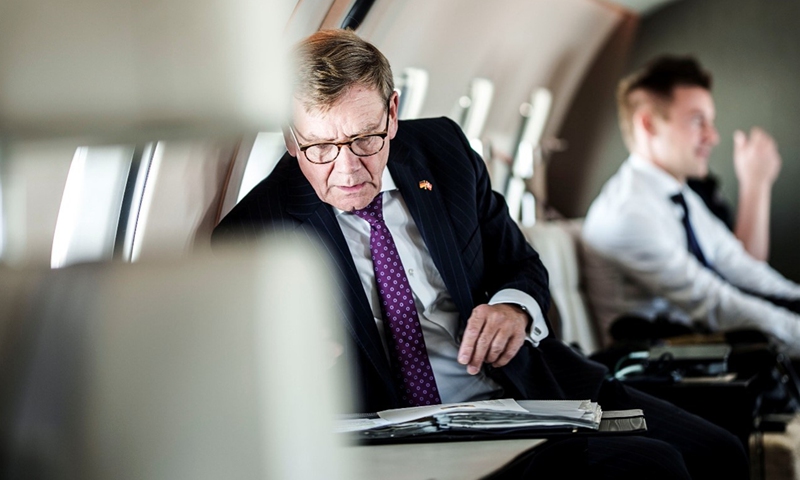Germany has sought to play down the impact of Foreign Minister Johann Wadephul’s decision to postpon visit to China, with officials and media outlets emphasizing that Berlin remains committed to dialogue with Beijing.
Wadephul told media the trip was “only postponed, not cancelled” and stressed that Germany has “a very long-standing, good relationship with the People’s Republic of China,” adding the government is “always ready for dialogue,” according to a video released by AFP on Monday.
According to Deutsche Welle on Tuesday, after calling off the trip, Wadephul, a Christian Democratic Union (CDU) politician, said he planned to speak with Chinese representatives by phone “as soon as possible and reschedule the trip,” though no new date has been set.
Further signaling Berlin’s intent to maintain communication, deputy government spokesperson Steffen Meyer, a Social Democrat (SPD), said on Monday that Berlin is still interested in a “respectful and good dialogue” with China, saying that he did not see “the postponement as having any major impact on the German government’s future policy,” the German Press Agency (DPA) reported.
DPA also cited a spokesman for the German Foreign Office, saying “We want to work closely together, they are interested in a constructive exchange, and so it is clear: China and Germany both need this cooperation.”
These remarks were widely interpreted by German media as an attempt to tamp down domestic concerns. DPA ran the headline: “Germany plays down China spat after foreign minister’s trip cancelled,” while Deutsche Welle described it as “Berlin downplays impact of postponed China trip.”
Yet the postponement — along with recent hawkish rhetoric toward China — has sparked criticism from within the German government, media and business community. The episode “indicates ongoing adjustments in Germany’s China policy,” Jiang Feng, a research fellow at Shanghai International Studies University and president of the Shanghai Association of Regional and Country Studies, told the Global Times on Tuesday.
Jiang noted that faced with mounting internal and external pressures, Germany’s pragmatic faction is urging closer engagement with China. “The foreign minister’s latest remarks are also the result of domestic pressure from pragmatists,” he said.
He argued that the new German government has yet to develop a clear and stable judgment on China — leading to wavering decisions influenced by media and political sentiment. “Before announcing the visit, the German foreign minister was still pointing fingers at China,” Jiang said. “If he wants to come to China, he must show proper restraint. The purpose should be to develop, improve and deepen relations, not to criticize.”
While Wadephul’s visit remains in limbo, others within the ruling coalition appear to be advancing cooperation. The Pioneer reported from SPD circles that Social Democratic Finance Minister Lars Klingbeil is expected to travel to China from November 17 to 19 for a financial dialogue.
The report added that differences in China policy may widen rifts within the coalition: compared with Wadephul, “Vice-Chancellor Klingbeil intends to take a different approach toward China,” it wrote, suggesting that if Klingbeil succeeds, another rift within the coalition will become visible
Jiang said Germany’s coalition dynamics are evident: Social Democrats and Bavaria’s Christian Social Union (CSU) hold a more pragmatic stance toward Beijing, while “de-risking” rhetoric from parts of the CDU has influenced the chancellor and foreign minister. These tensions, he said, are “part of a policy adjustment process,” and he expects China-Germany ties to return to a practical trajectory, given their fundamental alignment of interests.
Earlier, SPD foreign policy spokesman Adis Ahmetovic warned that “the short-term cancellation of the trip to China does not bode well for an improvement in tense German-Chinese relations,” calling for a rethink of Germany’s approach and stressing “direct dialogue with China.”
Jiang cautioned about “internalizing and politicizing” China policy — turning bilateral relations into a tool of domestic partisan struggle — remains a serious challenge. “Germany must ultimately achieve unity in its attitude toward China, or deterioration of ties will directly harm German companies and local economies,” he said.
China also responded to Wadephul’s postponed visit on Monday. When asked by DPA regarding the issue, Chinese Foreign Ministry spokesperson Guo Jiakun said: “China always views and grows its relations with Germany from a strategic and long-term perspective. China and Germany are major countries and leading economies in the world, and cooperation is mutually beneficial.”
“Under the current circumstances in particular, it is all the more vital for the two sides to uphold mutual respect, equality and win-win cooperation, and advance the bilateral relationship on the right track,” Guo added.




